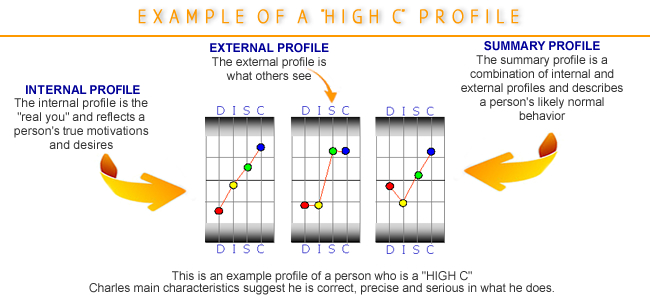
Charles has an interest in structure and organization.
He likes to be certain of his position, and will tend to research a situation
thoroughly before coming to a conclusion. Charles thinks in terms of
facts and rationality, and rarely concerns himself with the more personal
side of problems. If placed under pressure by others, he will prefer
to use logical argument or appeal to the facts, rather than become involved
in a conflict situation. Because of his interest in fact and detail,
and the somewhat reserved, undemonstrative element of his approach, Charles
tends to have wide knowledge on a variety of subjects, and can represent
a valuable resource. He will rarely volunteer information, however, and
requires support and encouragement from others if he is to overcome his
naturally aloof nature.
Advantages
- Charles works particularly productively with other people. He performs
well in teams or groups, having a natural ability to co-operate effectively
with others on a practical level, and is satisfied to see himself simply
as part of a group rather than seeking to further his own personal
ends. A strong sense of structure and rule-orientation pervades his
style. He can be relied on to follow instructions and procedures to
the letter at almost all times.
Disadvantages
- Dependence on others is perhaps the most distinct weakness of Charles's
approach. He has little confidence in his own abilities, except within
a particular area of expertise, and is heavily reliant on others to
help him complete tasks. His reluctance to act without being certain
of the outcome means that he will normally refer decisions of all kinds
to work colleagues or management, whether or not this is actually necessary.
Communication
Style
- Communication to people of Charles's kind is, at least in a work
context, purely a practical matter. He responds to requests for information
or action, but rarely makes comments himself unless drawn to do so
by more assertive individuals. Despite this reserved element, however,
he does work well in groups, taking advantage of the practical support
that such an environment can offer. Because of his practical turn of
mind, Charles will tend to approach relationships in a somewhat pragmatic
manner. His conversation rarely ventures into the realms of personal
or emotional matters, and he prefers to remain on a less open level,
unless the relationship in question is very close indeed.
Decision Making
- In coming to a conclusion, Charles will prefer to discuss it with
his work colleagues and management, where appropriate, and to take
time to examine all of the practicalities of his position. He tends
to think in terms of systems, and so his criteria for judging a situation
include ease of implementation in conjunction with possible outcomes
of a course of action.
Organization and Planning
- While he possesses relatively strong organizational skills, Charles
will prefer to use these as part of a group, rather than build plans
on his own. This is a safety strategy, designed to ensure that he does
not overlook any relevant factors in making his plans. He is naturally
organism and structured in his approach.
Motivation
- People like Charles, who value certainty and precision, often find
it very difficult to work independently. This is because he needs the
support of colleagues to confirm or discuss his plans and ideas before
he puts them into practice. Consequently, he will feel discouraged
and even pressurized if he does not have this support available. He
is best suited to work in a close team or group, where he can make
his contributions in a receptive atmosphere, and leave responsibility
for their implementation to others more prepared to take direct unsupported
action.
Managing Style
- Charles will tend to adopt a democratic style of management, and
is more than willing to delegate responsibility to others, especially
in areas where he feels that he lacks essential knowledge or skills.
He dislikes confrontation with others, and hence tends to try and evade
possible conflicts, rather than addressing problems directly.
Style of Management Required
- Charles will generally require considerable management attention.
This is not because he needs supervision, but instead because he needs
to be absolutely sure of his position, and cannot act effectively until
he is quite certain of a manager's expectations of him. For this reason,
requirements should be explained in great detail, and his areas of
personal responsibility clarified.
Primary Traits:
- Passive and Controlled
People of this kind are structured, organism individuals who tend to
follow the rules whenever they can. They are interested in precision
and order.


